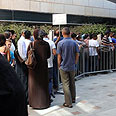
Only one in four Israelis feels the country is providing a bright future for their children; and one in three reports that their household income allows just a minimal standard of living: These are some of the results of the 2012 Social Resilience Index.
Related Stories
- Poll shows more Israelis fear for their jobs
- Poverty Report: 123,500 join Israel's poor
- Political instability risks financial strength
The survey, which is held annually, measures different parameters indicating levels of social resilience in the public. The survey is conducted by the "Maagar Mochot" institute and samples 535 respondents aged 18 and over.
The complete results will be presented at the 10th annual Israel-Sderot Conference for Society, hosted by the Sapir Academic College.
According to the survey, only 26% of Israelis feel that the country is providing a bright future for the next generation and only 46% said they felt the State protected them and their families; and only 58% said that Israel was the best country for Israelis to live in.
These questions, which were part of a broader category gauging the public's sense of solidarity, noted the sharpest drop and was graded the lowest of all the indices held over the past seven years.
Lack of public confidence
The economical capabilities index indicated a drop in the quality of life, with 57% stating that their household income allows only a minimal standard of living, a rise in 13% compared to the results noted in 2011.
The index reviewing job security faired poorly in comparison to last year as well, slipping 12% (61% to 49%) in those who said they felt secure at their workplace.
An index gauging public confidence in public systems showed minimal support by the public in government run institutions. The number of Israelis who had faith in the judicial system (22%) is at a new seven year low.
Additional seven-year lows were registered in public confidence in the police (14%), Social Security (10%), social NGOs (23%), media (10%) and political parties (7%).
The corruption index also testified to the disintegration of Israeli's social resilience. A solid majority of 78% of respondents said they believed that corruption within the government was either high or very high, the highest recorded in seven years.
Almost all respondents (77%) presumed political parties were corrupt, a 17% spike in comparison to last year. Additionally more than half of those sampled said they believed the Knesset (59%), government offices (55%) and local authorities (49%) act in a corrupt manner.
- Receive Ynetnews
updates directly to your desktop















